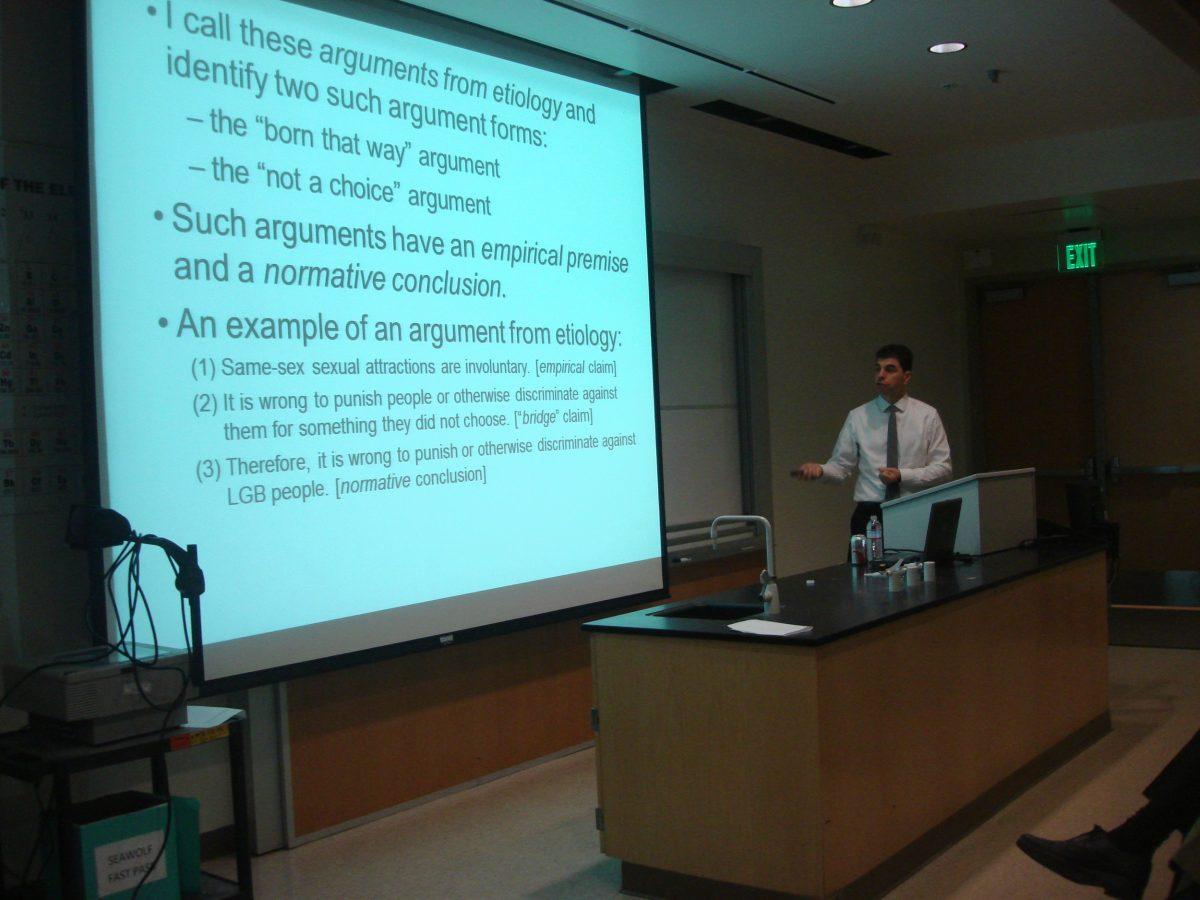The controversial topic of whether homosexuality is an orientation developed by genetic or environmental causes has got people wondering.
In the lecture, “Problems with ‘Born that Way’: Sexual Orientation, Science and the Law,” Edward Stein educated students about the logistics of other ways homosexuality may be generated.
“My conclusion is quiet unpopular,” said Stein.
Stein is the vice dean, professor of law and director of the Gertrud Mainzer Program in family law, policy and bioethics at Benjamin N. Cardozo School of Law.
He holds a doctorate in philosophy from Massachusetts Institute of Technology and a Juris Doctor, a professional doctorate and first professional graduate degree in law from Yale Law School.
During the lecture he spoke of the embodiment of sexual orientation, which was a core topic. According to Stein, sexual orientations are clearly embodied. He stated that sexual orientations involve beliefs and desires, which are cognitively meditated, which therefore suggests that cognition is embodied.
In simpler words, he means to say that sexual orientation is not necessarily genetic because it is practiced through a course of beliefs and desires.
He challenges the mind to not think of the reasons as to why sexual orientation is embodied, but instead understand how it is embodied.
Stein mentioned that sexual orientation is more so a combination of innate and environmental causes, those concerning nature versus nurture.
In addition, he believes that all human traits are the result of environmental and genetic factors.
In fact, he gave the example of how eye color, though a trait mainly dependent on genetics, is affected by the environment as well. He continued by saying that choices aren’t biologically inherited.
“There’s a gene for blood type, but not a gene for taking an anthropology class,” said Stein.
Stein presented evidence as to why he suggests there are several problems to the belief that sexual orientation is influenced through birth.
“It is a bad and dangerous argument,” said Stein.
Stein used three studies based on the empirical premises using scientific research on homosexuality that prove his theory correct: LeVay’s hypothalamus (INAH3) study, Bailey and Pillard’s twin studies and Hamer et al’ gene linkage (Xq-28) studies.
LeVay looked at the brains of dead people, and discovered that the third interstitial nucleus of the anterior hypothalamus was more than twice as big in heterosexual men than it was in homosexual men. This suggested that there was a direct biological linkage to sexual orientation.
However, there were several criticisms that questioned the accuracy of LeVay’s study. First, his small sample size consisting of less than 20 subjects in each group was far too small to make an overall generalization of all homosexuals.
Second, there was no direct information on the sexual orientation of the autopsy. It was simply assumed that those who were HIV positive were homosexual and those that were HIV negative were not homosexual.
The twin study also suggested genetic and environmental contributions to sexual orientation. In the study, Bailey and Pillard tested the concordance for male homosexuality.
Results said that for every pair of identical twins, the probability of the two having identical sexual orientations were 52 percent.
For fraternal twins it was 22 percent, for non-twin brothers it was nine percent and for adopted brothers it was 11 percent.
“My concern is that there is an ascertainment bias,” said Stein. “Even if sexual orientation was based on things like eye color, then the argument of ethology would still be epitome because it would still be based on the choices you make.”
He continued to challenge the audience to think about the bioethical problem that supports the argument of “born that way.” He gave the examples of the judicial reception of immutability in context of LGB rights litigation.
Stein referenced two U.S. Supreme Court cases in which same-sex couples fought for their right to marry, but the high court ruled that banning same-sex marriages was constitutional because it did not allow for procreation.
Same-sex marriages in California are now legal, however questions still remain.
The curiosities of whether sexual orientation is something one is born with may not have an accurate answer for a while, but researchers are aiming to find the key.



































